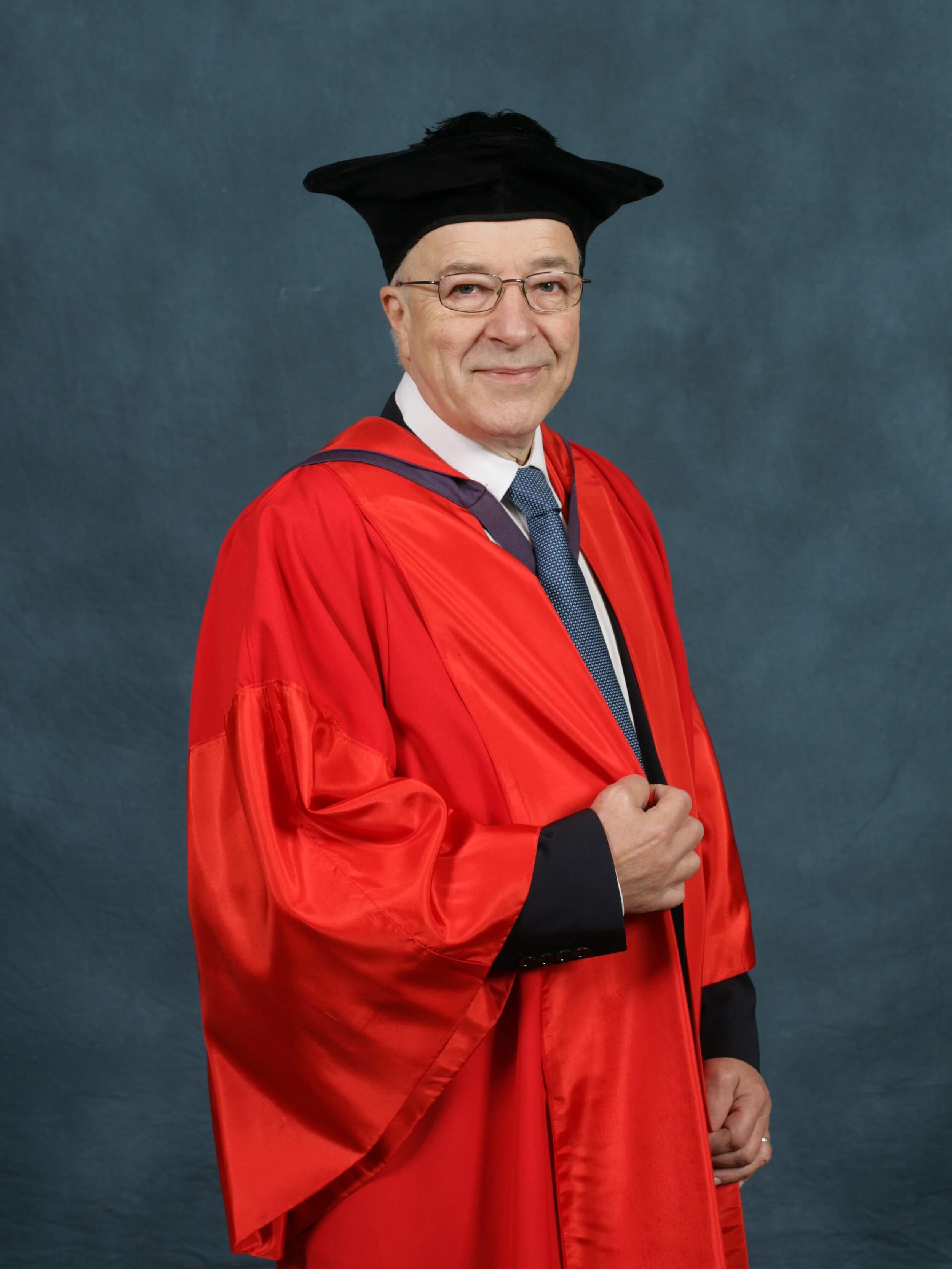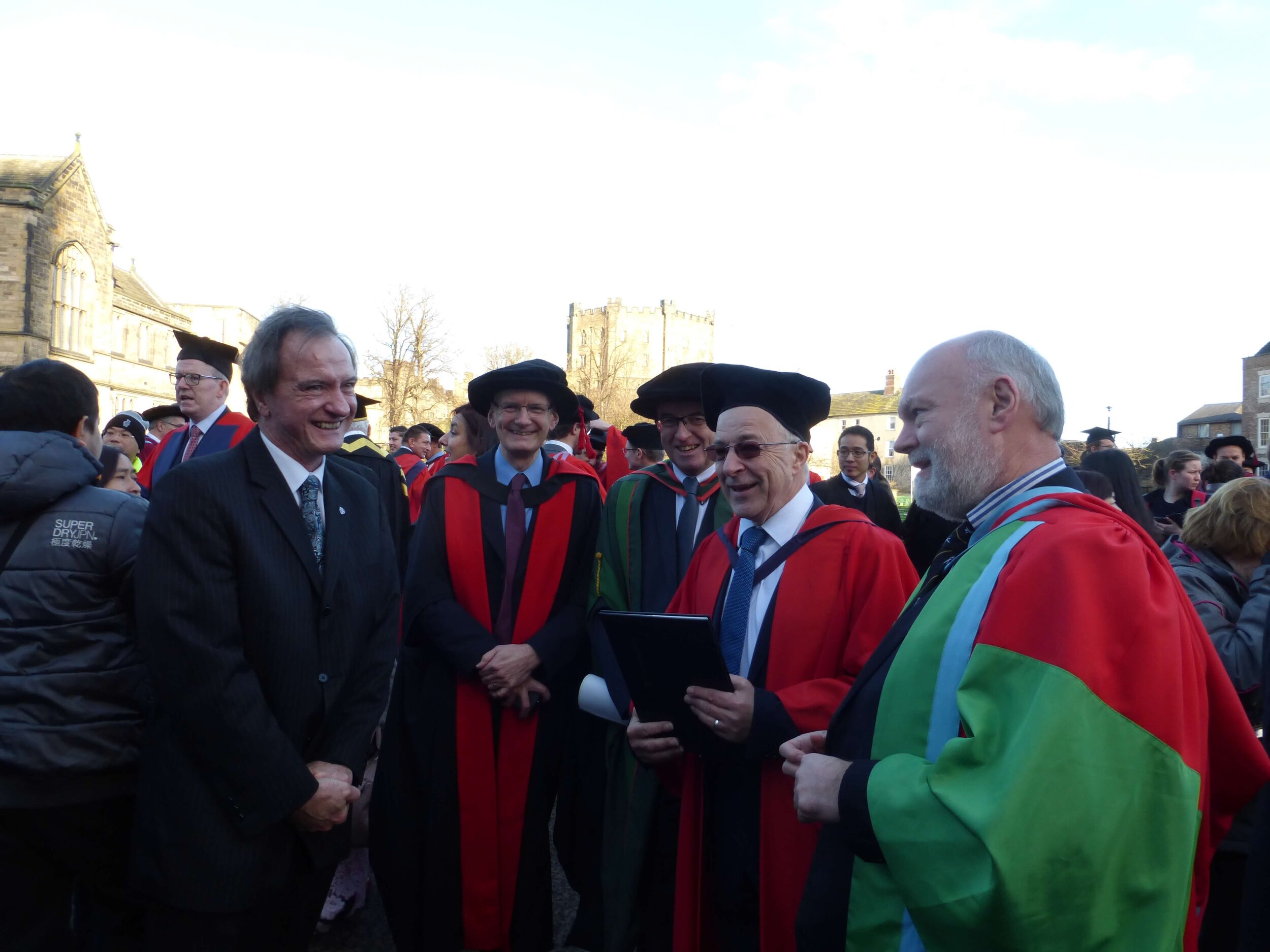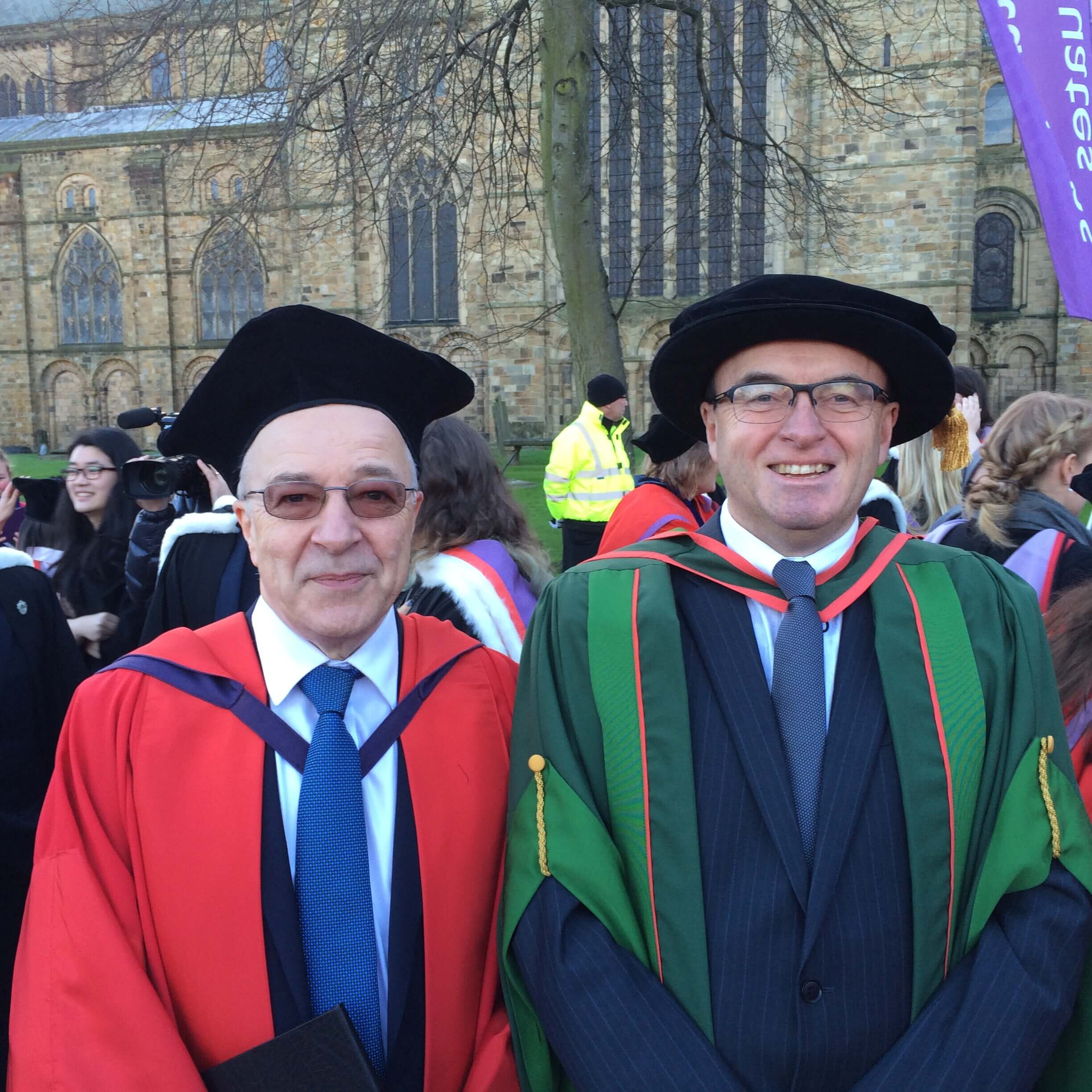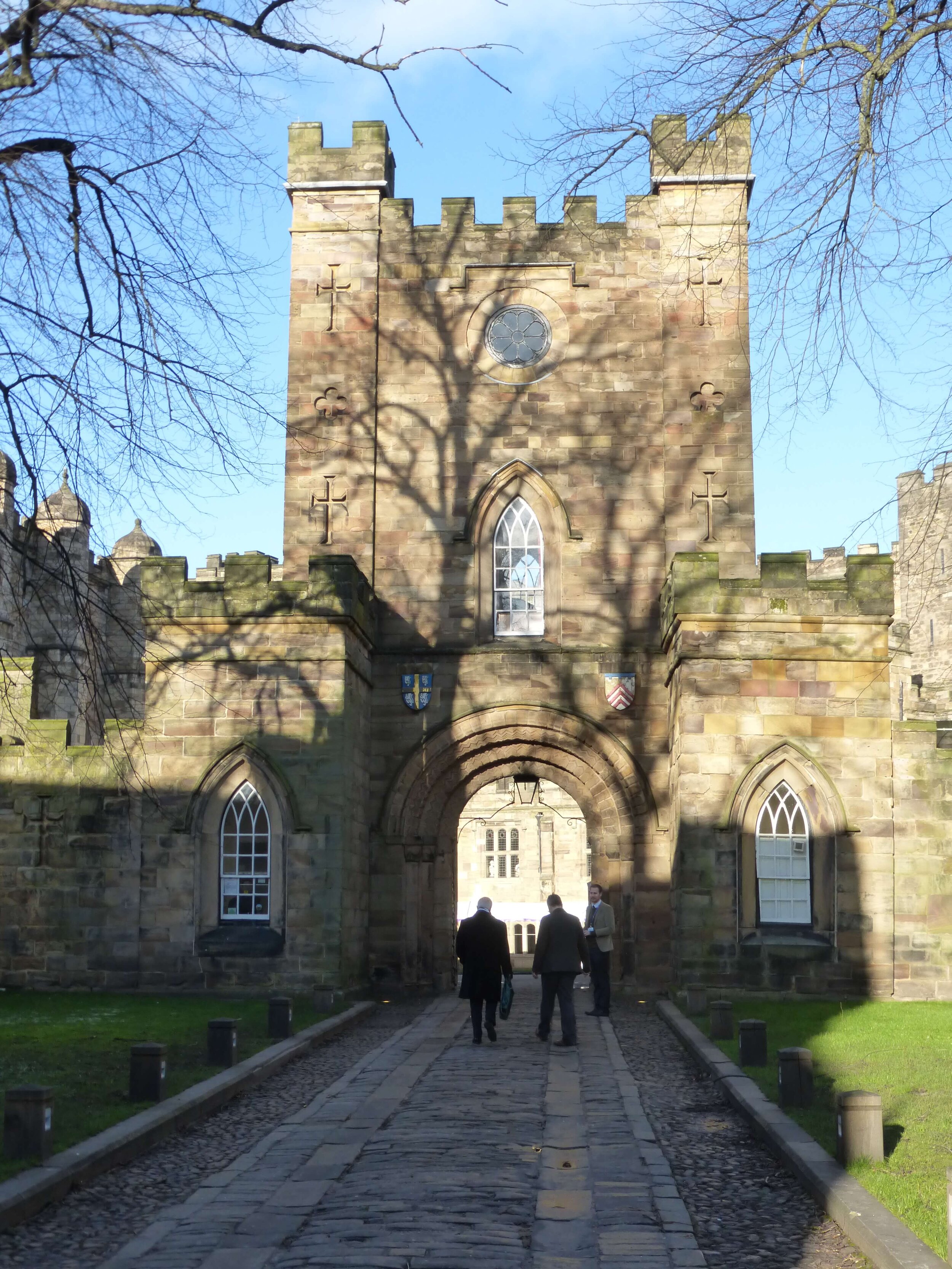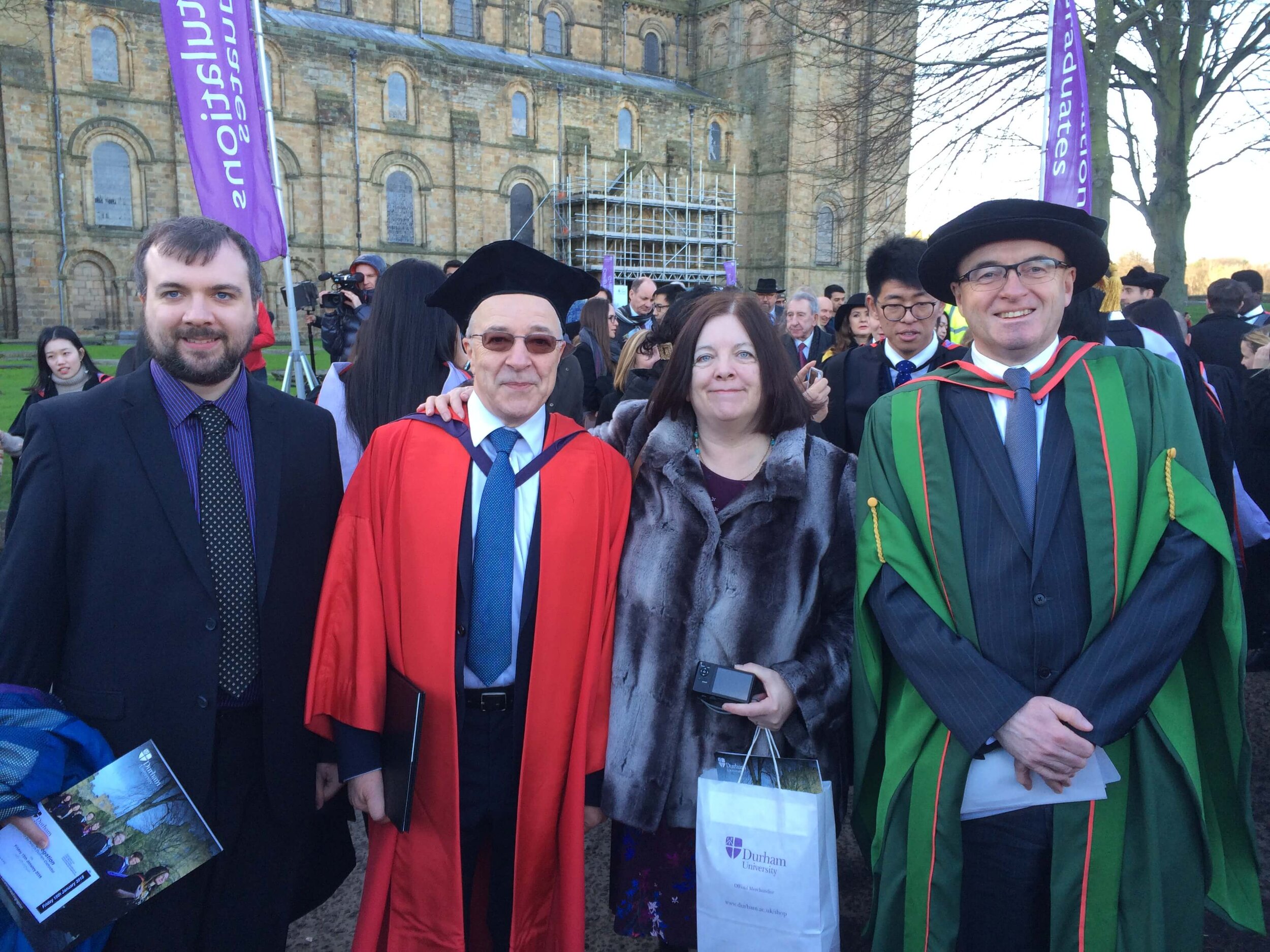Honorary DSc from Durham University, 2016
Doctor of Science honoris causa awarded by Durham University. Durham is my adopted university, largely because of my long research association with Bob Holdsworth and his team, on basement reactivation and other topics. I’m also still on the Advisory Board for the Earth Sciences Department. This award was a genuine surprise, honour and pleasure - also a wonderful excuse to dress up in red and wear an outrageous hat. Pictured below is the colourful ceremony at Durham Cathedral, and a tour of the cathedral, library and castle with Barbara and our mathematician son Michael.
Oration by Professor Bob Holdsworth:
Anthony George Doré grew up in Derby as a child of working class parents and after school went on to UCL to study Geology. As a new graduate he joined Conoco in the Seventies and from there went on to great successes both in the commercial petroleum sector, but also as a scientific leader within the petroleum geosciences. Remarkably he has managed to do this consistently for well over 30 years – and has helped to put UK petroleum geosciences in a world-leading position. Most fortunately for Durham, he also has had a long and sustained interest and participation in the petroleum-related research and training activities of the Earth Sciences Department.
In his career to date, Tony has achieved some of the highest possible offices within the petroleum exploration business, including Chief Geologist and New Exploration Ventures Manager in Conoco, and Exploration Manager Western Europe and Vice-President Global Exploration Americas in Statoil. He was until 2012 responsible for all Statoil's entire Americas exploration, covering regional geological mapping, prospect analysis, exploration and appraisal drilling activities, with total operating budgets running into billions. He has been and is, by any standards, an outstanding explorer.
Unusually for this business environment, Tony has also continuously maintained contact with his academic roots. He has published over 60 wide-ranging scientific papers, primarily on continental margin evolution and structure, which are of lasting value to the UK and global geological communities. He is an outstanding writer and speaker. He has forged links between the petroleum industry and academia through his involvement in many conferences, publications, committee work and sponsorship. These include conferences and publications for the Norwegian Petroleum Society, the American Association of Petroleum Geologists and the Geological Society of London (GSL). He has served as Editor of “Petroleum Geoscience, as Chairman of the Petroleum Group of the Geological Society and also as a member of GSL Council.
His first major academic contributions arose through combining on-going research with the wealth of offshore data available to the oil industry in the 1980s and 90s. These led to a series of geological evolution syntheses of the North Atlantic-Arctic region which are widely referred to, as a basis for oil and gas exploration, as a context for local research and as a source of testable postulates. Prominent among these ideas is that of the key role of reactivated basement structures during evolution of the Atlantic-Arctic rift.
A related strand of research concerns the enigmatic development of Cenozoic-age compression-inversion structures on the North Atlantic margin. He was the first to recognise that this post-continental breakup compressional deformation is a global process, leading to the development of structures that are important hydrocarbon exploration targets. Tony has also led research into the larger-scale phenomenon of passive margin uplift and exhumation. He was actively involved in the debate on alternative mechanisms to explain this process and drew attention to the radical effect this has on the hydrocarbon potential of the exhumed marginal basins. This led to specific predictions of global significance as to the nature of petroleum systems expected in basins that are exhumed versus those that are at maximum burial depth.
Since 1996, Tony has played a key role in the development of excellence in Earth Sciences at Durham, where he holds an Honorary Chair. He has been a highly proactive (and longest serving) member of both the Durham Earth Sciences and CeREES Centre for Geoenergy advisory boards. His leadership and vision have helped shape the development of the Centre by keeping its management abreast of new developments, trends and fashions within the energy industry. This has enabled CeREES to be highly sucessful in both its research and funding acquisition.
Almost unbelievably, Tony has somehow managed to maintain an entirely different career as an accomplished musician, something that began through playing in bands with friends in Derby. Suffering from what he terms 'guitar acquisition syndrome', he became something of a mover and shaker in Sixties and Seventies London. Early ‘psychedelic folk’ records released by his band, Tony, Caro and John have developed something of a cult following and, as recently as 2011, he has released commercial albums under the banner of Tony Dore & Friends. His love of electric guitars also almost robbed us of his talent as, at a Summer Ball in 1976, he was electrocuted and blown clean off the stage into the crowd. His bandmates of course, all assumed this was just him trying an early version of crowd surfing – all part of the show!
In summary, Tony Dore is a charming and exceptional individual who has achieved some of the highest possible offices within the petroleum exploration business. Through his energy and infectious enthusiasm, he has also remained at the forefront of his science and helped put industry concepts and data into academic hands by publishing, editing, convening and collaborating over the last three decades. Tony is, in every sense of the word, a Great Enthusiast. It is unsurprising, then, that he has been honoured with many awards including the Petroleum Group Medal (2006), Order of the British Empire (2010), an AAPG Special Award (2011) and the GSL William Smith Medal (2015). Given this lifetime of achievement and his long association with Durham University, he is therefore a very worthy recipient of an Honorary Degree.

